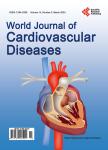Clinical Implications of Tumor Necrosis Factor-Alpha, Interleukin-6 and Resistin in Coronary Artery Disease
Clinical Implications of Tumor Necrosis Factor-Alpha, Interleukin-6 and Resistin in Coronary Artery Disease作者机构:Department of Biochemistry Quaid-i-Azam University Islamabad Pakistan
出 版 物:《World Journal of Cardiovascular Diseases》 (心血管病(英文))
年 卷 期:2014年第4卷第9期
页 面:416-421页
主 题:Tumor Necrosis Factor-Alpha Interleukin-6 Resistin Coronory Heart Disease Gene Polymorphism
摘 要:Tumor necrosis factor alpha (TNF-alpha) and interleukin-6 (IL-6) are involved in the progression of coronary artery disease (CAD). The cytokines’ levels are associated with the severity of CAD. We have recently reported on the association of resistin, a relatively novel cytokine with the pathogenesis of cardiovascular disease (CVD). Although the inflammatory cytokines’ impact on atherosclerosis is widely accepted, yet some controversy exists regarding the involvement of these factors in atherogenesis. The current review highlights the potential association of TNF-alpha, IL-6 and resistin SNPs (single nucleotide polymorphisms) with CAD. Molecular genetics data along with the intracellular signaling cascade mechanisms may have important clinical implications in the treatment of CAD.



